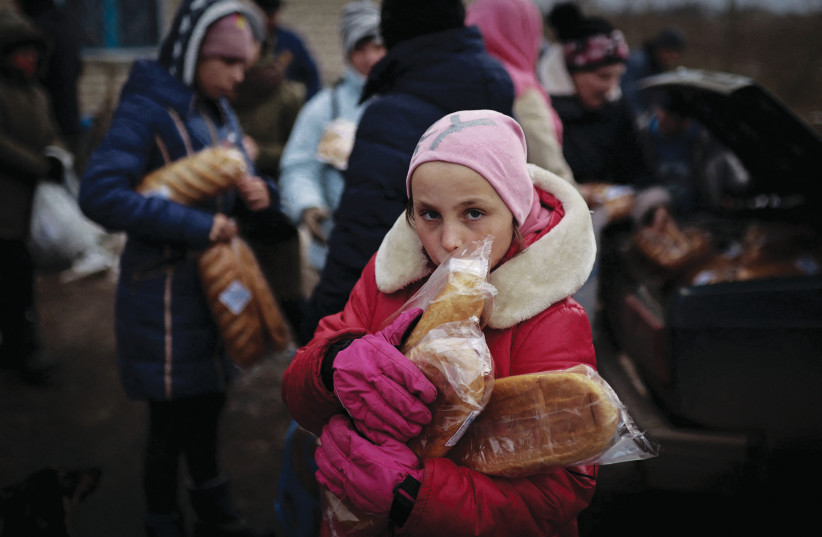
In Our Enemies Will Vanish: The Russian Invasion and Ukraine’s War of Independence, Kyiv-born Yaroslav Trofimov remembers the city’s Botanical Gardens, where he first kissed a date; the museum where he encountered French Impressionist paintings; the cinema where he watched Fellini movies, “whose sensual scenes had been removed by Soviet censors”; and his Jewish grandmother.
In 2022, Trofimov returned to Ukraine, as a war correspondent for The Wall Street Journal. The Russians, he writes, “thought it was theirs, in a country they believe didn’t exist, part of a nation they told themselves had been invented.”
And Kyiv “seemed on its deathbed, listless, bled of its people. How dare they,” he thought.
Trofimov (author of Faith at War and The Siege of Mecca) provides a compelling, up-close-and-personal account of Ukrainians’ fight for their independence in Europe’s most consequential shooting war since 1945.
An up-close-and-personal account of Ukraine's fight for independence against Russia
When Russian troops occupied Crimea and Donetsk and Luhansk in the Donbas region of eastern Ukraine in 2014, Trofimov reminds us, the leaders of NATO countries imposed mild sanctions but provided no military assistance.

Vladimir Putin was confident that Washington, London, Paris, and Berlin would sit on their hands again; Ukrainian soldiers would put up token resistance before switching sides; and an overwhelming percentage of the population would follow suit. He, therefore, concluded in 2022 that the Russian military could capture Kiev in a blitzkrieg, install a collaborative regime, pacify the whole country in 10 days, and liquidate Ukrainian elites, as a “lesson and atonement for their crimes,” namely refusing to self-identify as Russians.
This time, Trofimov reports, the Ukrainian army, some 205,000 uniformed troops (32,000 of them women), was ready, and a remarkable number of citizen volunteers flocked to defend their nation. In the Donbas, many mayors and governors and a sizable percentage of villagers and city dwellers had soured on Putin’s “‘Russian world’ irredentism” and resisted the occupation. And although delivery was slow – and sophisticated air defense systems were not included – NATO countries supplied many of the heavy weapons President Volodymyr Zelensky requested.
Our Enemies Will Vanish analyzes diplomacy, military tactics, and strategy on both sides. But the book is at its best in telling the stories of ordinary people caught in the maw of modern warfare. Because the word “Russia” comes from the Kyiv Rus principality, Trofimov tells us, tens of thousands of Ukrainians signed a petition to rename Russia “Muscovy” in the Ukrainian language. In official statements and military documents, Russians were called “Orcs,” the humanoid monsters in J.R.R. Tolkien’s Lord of the Rings.
Oleh Voronko – one of the millions of Ukrainians who have some Jewish lineage or are married to someone who does – stands guard over the Brodsky Synagogue, brandishing a Kalashnikov rifle; the Azov Regiment, whose early leaders were neo-Nazis, is now supported by Jewish billionaire Ihor Kolomoisky and has Jews and Muslims in its ranks.
Ukrainians often live without electricity and running water for months. Destruction and death are random. A Russian cluster bomb hit a citizen of Bakhmut while he was tending his vegetable garden, far from the front lines. In March 2022, Serhiy Kosyanov spent two hours in line getting gas to move his family out of Kharkiv. Just as he was returning to his apartment building, a shard from a Russian projectile lodged between the skull and spine of his eight-year-old son. “I came home just a bit too late,” he said in the ICU. “All our pets have burned alive,” Elena, his wife, added, as she held Serhiy’s hand. “Two cats, one dog, one hamster.”
Russian soldiers fled Bucha so fast, Trofimov indicates, that they didn’t have time to conceal the bodies of tortured civilians – poked-out eyes, cut-off fingers, the torso and head of a woman in a garage. Although dozens of journalists verified the evidence firsthand, Russian officials insisted these people were not really dead.
And Putin commended the brigade that committed the atrocities.
Trofimov understands why many Ukrainians find “solace in viewing hours of drone footage of Russian soldiers getting killed and maimed.”
But when he looked at the faces of dead Russians, and the sleeping bags and pain medications in their backpacks, they no longer remained anonymous. What had they died for? Trofimov wondered, “Putin’s megalomania? The wounded pride of old men whose empire collapsed in 1991, just as they were supposed to inherit it?”
Trofimov completed his book before Ukraine’s ballyhooed summer offensive fizzled and a military appropriations bill stalled in the US Congress. That said, he leaves his readers with somewhat contradictory messages. As he celebrates Ukraine’s resilience after more than a year of war, he claims it is clear that the country where he was born “wasn’t going to disappear from the map again. It wasn’t going to be swallowed and digested from Russia.” However, after noting that the Russians had recently mobilized hundreds of thousands of troops and erected formidable fortifications along the front lines, he also warns that a Ukrainian defeat “would have devastating consequences” for the credibility of Western democracies and their capacity for deterrence around the world.
Trofimov reports as well that 76-year-old Ludmyla Bondarenko pointed to a crater left by a Russian bomb in her courtyard and asked, “It’s been going on for months. When will it end?” And Zoya Shilkova, her 75-year-old friend, replied, “It’s probably never going to end.”
Glenn Altschuler is the Thomas and Dorothy Litwin Emeritus Professor of American Studies at Cornell University.
- OUR ENEMIES WILL VANISH: THE RUSSIAN INVASION AND UKRAINE’S WAR OF INDEPENDENCE
- By Yaroslav Trofimov
- Penguin Press
- 400 pages; $32
